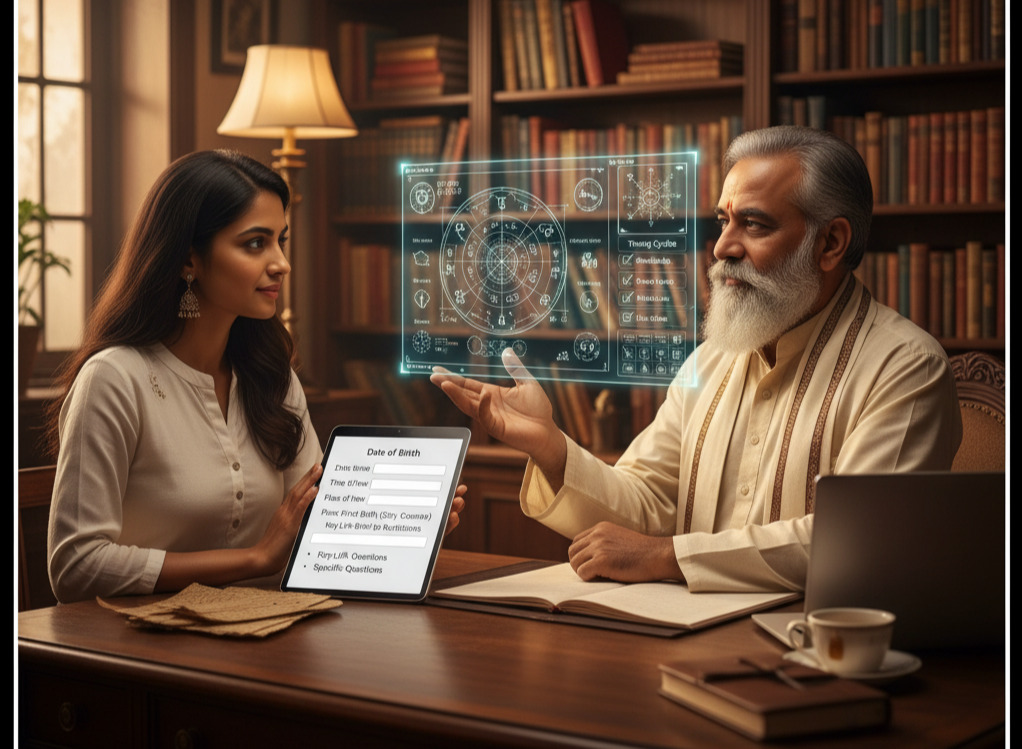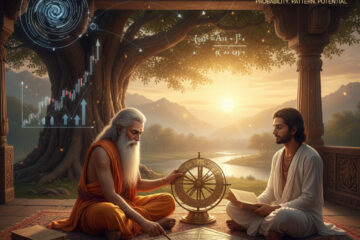Most astrology consults go wrong before they even start — not because the astrologer is bad, but because the initial message from the seeker is too vague, too long, or missing crucial birth data. A clean, respectful Vedic astrology reading request makes every part of the process smoother: chart preparation, rectification, timing, even the tone of the response.
This article lays out, step by step, how to contact an astrologer, what to include, how to frame questions, why exact time matters, and what not to expect. It’s written for sincere students who want to honor the astrologer’s time and also get a high-quality, technically grounded answer.
If you’ve ever wondered, “What do I actually send in my first email or message?” — this is your template.
Why a Proper Vedic Astrology Reading Request Matters
Jyotish is a timing science. Dashas propose, transits dispose. But neither of those can be applied precisely if the birth details are fuzzy. That’s why a well-structured Vedic astrology reading request always starts with data — not emotions. Feelings are valid; the chart still needs numbers.
On the astrologer’s side there’s another reality: many practitioners receive far more messages than they can handle. In fact, the original note in this series said that no new readings were being accepted after April 19, 2015 simply because demand exceeded time. That wasn’t rudeness — it was boundary + honesty. If you learn to send clear, concise, technically useful requests, you stand out instantly.
Step 1: Check Availability and Respect Boundaries
Before you pour your whole life story into a message, ask: “Are you currently accepting new reading requests?” This one line saves you and the astrologer from frustration. Many good astrologers open and close their calendars depending on workload.
Why is this important? Because a Vedic astrology reading request is not just data — it’s a relationship. Starting it with respect sets the tone for the whole consult.
Step 2: What Details to Send an Astrologer
Here is the non-negotiable core your message should contain:
- Date of birth: day, month, year (e.g. 17 October 1993).
- Exact time of birth: hour and minute. If it’s approximate (“around 3 pm”), say so — don’t hide it.
- Place of birth: city/town + country. This establishes latitude/longitude and time zone.
This matters because a 10–15 minute shift can move the ascendant, change the house in which a planet sits, and alter divisional charts like Navamsa (D9) or even Dashamsha (D10). If your lagna flips, your list of functional benefics and functional malefics changes — which means the astrologer’s advice also changes. This is why we insist on precise data.
When Time Is Uncertain: Birth Time Rectification
If you cannot give an accurate time, be transparent. Say: “I only know it was between 6 and 7 am.” Then immediately add 4–6 verifiable life events with exact dates. This is how birth time rectification (BTR) works.
Useful events for rectification:
- date of marriage / separation / divorce
- date of first job / major promotion / career change
- date of surgery / accident / major illness
- date of foreign travel or relocation
- date of child’s birth
The astrologer then matches these events against dasha–bhukti–transit signatures to narrow the time. Good BTR is slow and technical, not magical. So if you ask for rectification, expect the astrologer to ask follow-up questions and to charge accordingly — you’re asking for extra skilled labor.
How to Ask an Astrologer the Right Way
“Will I be happy?” is not a Jyotish question. “Is 2026 a better year for marriage than 2025, based on current dashas?” is a Jyotish question.
When writing your Vedic astrology reading request, ask yourself:
- Am I asking for timing (when)?
- Am I asking for direction (career vs business vs abroad)?
- Am I asking for risk windows (health, stress, litigation)?
Then limit yourself to 2 or 3 main questions. That’s not stinginess; that’s clarity. Three good questions are better than 30 scattered ones.
Examples of good questions:
- “In the next two years, which dasha–transit periods favor relocation or foreign work?”
- “Is my current dasha showing relationship stability or should I delay marriage?”
- “Are Saturn or Rahu triggering any health sensitivity between 2027–2029?”
What Astrology Readings Can and Cannot Promise
One of the biggest sources of disappointment is mismatch of expectations. So say it plainly:
- Can do: show high-probability windows for job change, marriage, health checks, relocations, study.
- Can do: explain karma themes — why some areas are slow (dusthana focus), why some are fast (trikona/11th support), and how upachaya houses improve with time.
- Cannot do: name your exact life partner, tell you the exact salary of your next job, or guarantee pregnancy on a specific date.
- Cannot do: replace medical, legal, or emergency help.
This is where our usual teaching applies: astrology is probabilistic. Dashas show potential, transits help delivery, and your choices supply free will. A realistic Vedic astrology reading request recognizes that.
Ethical Astrology Guidelines for Seekers
Ethics are not just for astrologers — seekers have ethics too. Here are a few to remember:
- Don’t ask the same question in five different ways to get the answer you want.
- Don’t hide key events (marriage, prior divorce, illness). Missing data = wrong chart story.
- Don’t expect unlimited follow-ups unless that was part of the arrangement.
- Don’t pressure for deterministic statements (“just tell me what will happen”). Serious Jyotish avoids absolutism.
When both sides stay inside these ethical astrology guidelines, the reading becomes what it was meant to be: light, not drama.
What to Do If Your Preferred Astrologer Isn’t Available
This happens a lot — good practitioners close their books. Here are grounded alternatives:
- Seek referrals: ask people who study Jyotish to recommend someone technically solid, not just popular.
- Study while you wait: learn houses, signs, basic dasha logic, and how divisional charts refine the D1. The better your questions, the better the answer later.
- Use software cautiously: software can calculate, but it can’t contextualize desh–kaal–paristhiti. Treat it as a calculator, not a guru.
Important Notes
Are you accepting new reading requests now?
The original notice (April 19, 2015) said no new readings due to time constraints. Treat that as your template: always ask an astrologer about availability first. Boundaries are healthy.
What exact birth details should I send?
Full date, accurate time (or a clearly stated approximation), and birthplace. If time is off by more than ~15 minutes, attach 4–6 life events for BTR.
What is birth time rectification and when is it necessary?
It’s a reverse-engineering process to find the most likely birth time using known events against dashas and transits. It’s necessary when the recorded time is vague and we want reliable house/divisional analysis.
How many questions should I ask?
Two or three. That’s the sweet spot for depth without overwhelming the astrologer. More questions = more sessions.
FAQ
If I only know the year and city, can I still get a reading?
Only a very general one. Without a time — or without BTR — we can’t time events, judge house cusps, or read divisional charts properly. Send event dates for rectification first.
What kind of questions give the best results?
Timing and scope questions: “When is my chart promising partnership?” “Which dashas support foreign travel or education?” Vague emotional questions produce vague answers.
How long does rectification take?
It depends on data quality. Clear dates + clear life description = faster rectification. One random memory from childhood = longer process.
Is it okay to ask for medical or legal outcomes?
You can ask for timing of pressure periods, but astrology should not replace doctors or lawyers. Use Jyotish to support decisions, not to gamble with emergencies.
What if the astrologer limits follow-ups?
That’s normal. Limits protect quality. If you have more questions, book another slot — that’s fair to both sides.
Keep Learning with Much Needed Astro
If this framework for a Vedic astrology reading request makes sense to you, you already think like a serious student. Stay with Much Needed Astro — we keep Jyotish clean, honest, and technically grounded, without superstition or fear tactics.
If you’re serious about studying real Jyotish, stay with Much Needed Astro — no fluff, no fear-mongering, just clarity you can actually use.




